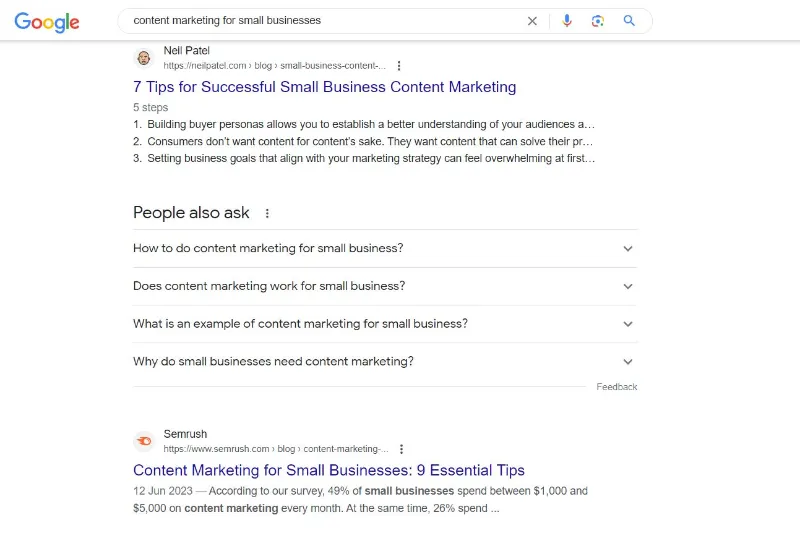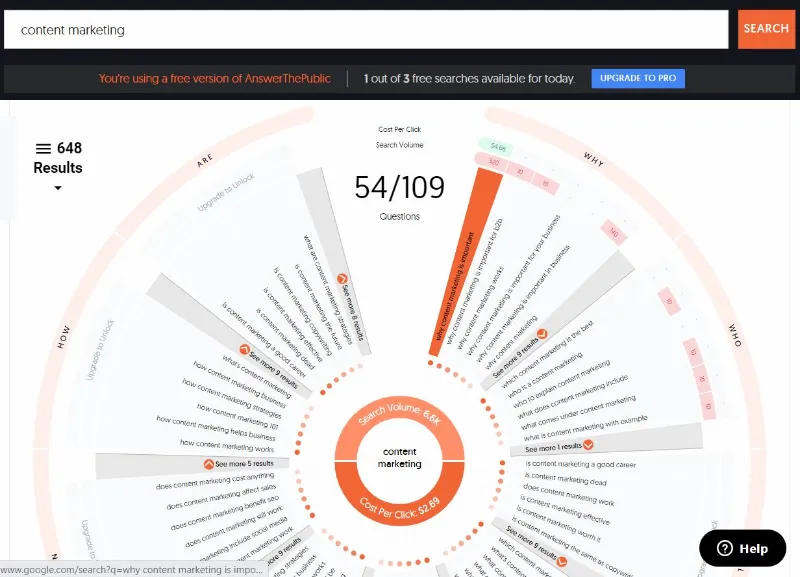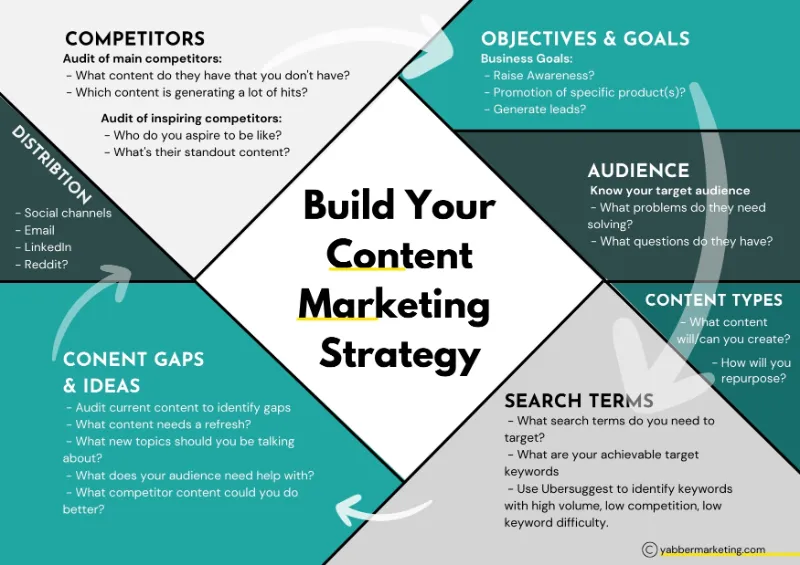Whether you’re looking to increase traffic to your website or raise brand awareness, content marketing is a highly effective strategy. The problem is, many small businesses I speak to feel they don’t have the time, lack inspiration, fail to prepare with an effective strategy, or don’t see the value in content marketing.
Today I’m going to be unpacking the myths around content marketing! I’ll explain what it is, why it’s important and provide some helpful ways for your business to generate ideas. I’ll also share my favourite tools, and show you how to form a strategy so that even the most time-poor business owners can unlock the power of content marketing.
What we’ll cover:
- What is Content Marketing?
- Does Content Marketing Work For Small Businesses?
- Content Marketing is Powerful
- How to Build a Content Strategy and Generate Ideas (free download)
- Types of Content to Produce
- How to Unlock the Power of Content Marketing – Our tips for making great content
- Free Tools for Creating Content
- Unlock The Power Of Content Marketing For Your Business
What is Content Marketing?
Back in my day (yes I’m old), content marketing broadly referred to blogging. But with the emergence of so many platforms there are now so many ways to access, view and consume ‘content’. Therefore, the term ‘content marketing’ now refers to the creation and distribution of all forms of content, in lots of different formats. These include:
- Blogs
- Guest blogs
- Videos
- Infographics
- Ebooks
- Podcasts
- Decks (Powerpoints to anyone above the age of 35)
We’ll delve deep into the creation of each of these later on.
Does Content Marketing Work for Small Businesses?
The primary goal of content marketing is to attract, win and retain customers. By creating high-value content your aim is to instil trust and foster relationships with your target audience. Content marketing allows you to show off key attributes and promote yourself. Trust me, it works for small businesses. If you don’t believe me take a look at how our content strategy and creation service has helped the small businesses we’ve worked with. Here are 8 benefits to content marketing.
1. Authority and knowledge
If you’re selling a product or service, content marketing allows you to position yourself as the voice within the industry. Creating helpful content that cuts through the ‘noise’ of all your other competitors will promote your own authority and knowledge.
2. Provides value
Let’s say you own a bookshop. What content could you create that will add value to your customers while promoting your store? I would recommend creating a list of the latest book releases by your most popular authors, or latest book releases by genre. Content like this is really valuable for this target audience. It saves them the hassle of researching new books and simultaneously encourages them to buy from you!
3. Improves SEO
Everyone is striving to achieve higher rankings and organic traffic so you’ll be pleased to know that creating great content will dramatically improve your SEO efforts. Here’s how:
- Increases Traffic: when you share your content on social media, forums, discussion groups and send it to your email contacts (which you should), people will visit your site. Search engines will notice any new activity which can lead to a boost in rankings.
- Internal Link Building: Creating new content provides the perfect opportunity to link to other pages on your site. If you mention a product you sell, link to it! Not only does this pass value to the pages you’re linking to, it improves the user experience and encourages search engines to crawl and index your site.
- Search Engines love fresh content: Search engines want to show the best results at the top of their results pages. This means that up-to-date, engaging, well-written content that is packed with value will outrank other sites. You may have to build external links (other sites linking to yours) but having great content will also naturally attract links. Search engines will also know if your site lies dormant for years. It’s a big fat no for me!
- Helps target search terms: Targeting search terms is an effective SEO strategy. Content marketing allows you to target long-tail search terms that contain 4 or more keywords. For example, an article that focuses on the 10 Best Cooking Books for Children, gives you the perfect opportunity to target the search term best cooking books for children. Don’t make content for content sake though. It should always be relevant and add value.
4. Keeps your audience engaged
If you’re not regularly producing and sharing content, you’ll struggle to keep your audience engaged. Creating content is like handing out invitations to your target audience, inviting them to peruse your latest insights. Exceptional high-value content will reel them back in. Then, it’s down to you and site to get them to take action.
5. Content Marketing feeds into your Social Media Strategy
Small businesses don’t tend to have their own social media management team and therefore struggle to come up with post ideas. Creating lengthy content allows you to feed into your social media strategy by repurposing your content. For example, when I produce a really great, in-depth blog I create emails, ten or more social media posts, videos and infographics.
Similarly, if we produce a podcast we’ll have it transcribed so that it becomes a blog post and social media posts too. Without content, creating all of these different digital assets becomes impossible, and we have significantly less to say on social media.
Basically, content allows us to create all of these different touch points and excuses to get in touch with people on mailing lists, which will increase engagement and traffic which again makes search engines take notice.
6. Attract new business
Depending on your distribution and promotional strategy, creating fresh and inviting content is a great way of attracting new business. Perhaps, your article can persuade someone into using your service, or a review you did of a particular product will be enough to convince them to buy from you. Either way, creating helpful and engaging content can really help put your business in front of a wider audience.
7. It helps to convert window shoppers
Around 3-17% of potential buyers are at the buying stage. The rest are considering, doing their research or just window shopping. What great, memorable content is does is leave a lasting impression on potential buyers so that when they become ready to purchase, they’ll purchase from you. Plus, if Google has ranked you well, you should no problem in being seen at the pivotal buying moments.
8. Retain customers
As the trust and authority builds, so will your customer loyalty. Regularly producing content ensures that you’re putting your business in front of people. Creating content is best way of showing up and being present. Be consistent and regularly publish content for long-term success.
Content Marketing Is Powerful
There is a lot of conflicting information on the web. It’s no surprise, that I get asked about content creation …. Alot! I see tons of marketing gurus encouraging people to ditch content marketing and focus on link-building, or adding schema to their site. Some even suggest focusing entirely on engaging with customers on social media.
But does any of this help small businesses achieve their goals? Well, yes and no!
The truth is, there are lots of different digital marketing tactics that will help you achieve better visibility online. But they need to be used together to support and promote amazing content. Because without content you’re going to struggle to attract backlinks (referring links) from external sites. And what would be the point of engaging with customers on social media channels WITHOUT CONTENT to refer them to?
If you’ve made it this far you should be now get the drift. Content Marketing is crucial to the success of your website. So let’s take a look at how to build a strategy, how to generate ideas and some helpful tools to get the job done.
How to Build a Content Strategy & Generate Ideas
Building a strategy for your content creation is vital! If you wing it, you won’t make the best use of your time and your content will fail to hit the mark! In order to create a concrete plan you’ll need to spend a bit of time thinking about several key components. Thinking about your strategy will also help you generate content ideas. Here’s are the 7 elements you need to assess:
Competitors
Take a look at your top 5 competitors and write a list of what content they have that you don’t have. I call this a content gap analysis. This will give you a really good idea of their approach to content. Look at the types of content across all of their channels and find the content that is really hitting the mark.
If you want to get a little more technical you could use an SEO tool like SEMRush to perform an audit on their content. See who appears for a search term you’re trying to target or type their url into the search bar and let SEMRush work its magic. Here you can evaluate which content is getting the most amount of traffic, what search terms they are targeting and see who is linking to their content.
Once you’ve done this you should decide how you can create similar content that is better than theirs. You should be asking yourself how you can make it more current, more engaging, more in-depth, and more helpful.
Objectives and Goals
What are your main business objectives and goals? Perhaps you need to promote a new product or generate new leads? Knowing what you want to achieve will help you decide which content will best align to achieving your goals. For example, if lead generation is important you may decide that building a downloadable guide or ebook is the best way forward. However, without clear objectives you’ll run the risk of trying to cover all bases which will lack consistency and dilute your message.
Know Your Audience
Develop an acute understanding of your target audience. Sounds simple right?, but you’d be surprised by the number of business that struggle with this. Instead of simply saying my audience is someone who wants my product, spend some time really thinking about the reasons why some needs what you offer.
If you’re a local karate instructor for example you’ll want to build different audience personas. You may have parents with young child looking for ways to build their child’s confidence or defend themselves. Women may be looking for self defence classes and a way of meeting people and getting fit. A portion of your audience may be attracted to the ancient principles of the martial art and looking for a club to fulfil this.
By breaking your audiences you can address individual concerns, driving forces and questions. Make a note of their potential roadblocks and address them in the best way possible.
Content Types
What type of content do you want to create. To be honest, the answer to this should be all of them as long as it is feasible possible. For small businesses with limited website traffic and activity I would recommend building powerful, authoritative content. Guides, top 10s, step-by-step guides and how to blogs remain pretty powerful blogs. However, you should give some thought about how you can repurpose them. Can you turn them into simple Reels? Interview someone on a podcast that can talk around the topic?
It’s important to considering your limitations. Don’t try to cover all bases and do everything badly. It’s better to focus your efforts on what’s achievable to and do one thing well. Just remember to factor in time to repurpose your content when possible.
Search Terms
As I mentioned earlier, blogs allow you to target additional search terms that you aren’t already ranking for. Think about what search terms you’d like your site to rank for. Once you’ve got a list use a tool like Ubersuggest to assess keyword volume and difficulty. You’ll want to target search terms with relatively high search volume and a keyword difficulty score of no more than 20.
If you don’t know what search terms you should be targeting you can always do a Google search. Type in your topic and you’ll see a section on the search results ‘People also ask…’ use this as headings for your blog or add them to your list of search terms to evaluate and target.

I often use this tactic to inform what my blog content should cover. I get my ideas from looking at competitors and knowing what keywords they are ranking for that I would like my site to rank for.
Content Gaps and Ideas
We’ve already looked at how assessing your competitors can identify gaps, now it’s time to take a look at your existing content. You may already have some content, but is it better than what your competitors have produced? How can it be updated and enhanced? Thoroughly audit your content and make a note of:
- What needs updating: Are there more current articles you could refer to? Are facts and figures outdated?
- What needs fixing: If you have old content with broken links, fix them, redirect them or remove them completely.
- What needs deleting: If you come across really old blogs that no longer add value or are really short (less than 850 words), make a note of the action you’re going to take. If the blog is still relevant, expand on it, build internal links and make sure it’s well optimised. If you’re deleting blog posts remember to redirect the link to the newer article or another page on your site with a 301 redirect.
For new content refer back to your audience research and list all the things that your audience really needs help with. Look at your competitors again and add to your list the topics that you haven’t covered. Can you come up with a different angel?
Distribution
You’ll naturally want to distribute your content across your social media channels. But Instead of simply posting the same thing across all your channels, think about the best way to utilise your social media. For example, you may want to create a Reel for your content, or write a shortened version of the article for LinkedIn.
You can utilise other platforms too like Reddit, and industry forums to link to your blog. If you have a list of subscribers, send it to them. If you don’t, send it to your email contacts. Ask other industry specialists to share it in return for sharing their content. Just make a plan of attack – an achievable one – and stick to it!

Types of Content to Produce
There are lots of different types of content that you could produce, but most of it will come down to how much time and money you have. For small businesses, these are the types of content that you should focus on creating.
Comprehensive guides
Guides provide untold amounts of value. It could be a guide to finding the product (products that you sell), or a guide to do a specific task that specifically relates to your business. If you’re a service provider, don’t be afraid to give your audience proper guidance on how to do it themselves. If it needs a specialist they’ll probably ask you to do it anyway. However, consumers and service users like to have knowledge and a comprehensive guide is the best proof that you’re the expert they need.
Step by Step guides
These types of content are amazingly successful. By breaking down tasks you can teach your audience while demonstrating your own expert knowledge. If you aren’t camera shy and handy with a camera, you could produce YouTube videos to accompany your blogs. Just make sure they both link to each other so you’re always providing the reader with options of how they want to follow your step-by-step instructions.
Case Studies
Success stories are one of the best ways of proving your value. If you can demonstrate how your product or service has enhanced a life then you’re on to a winner. I’ve done this with several businesses and when we’ve created first hand accounts from customers they have proved very beneficial at converting new audiences.
Podcasts
Podcasts are really popular because they are super easy to ‘digest’. As a more passive way of getting information you could use a Podcast to talk about industry changes, customer challenges, recreate some of your step by guides (especially if they don’t rely on visuals). You could interview previous customers and talk about their experience, or interview leading figures within your niche. Your podcast could even focus on the day-to-day running of your business. Funny anecdotes and every day challenges make your business more human and accessible.
Podcasts can be transcribed into written blogs which can be published onto your site.
Infographics
Infographics are a great way to make data heavy content visual. The beauty of infographics is that they are easy to share and great for grabbing attention. Remember to include the URL of your site or blog article on the infographic to drive traffic back to your website.
Guest Blogging
Guest blogging is hugely beneficial. It allows you to reach a wider audience, reinforce your authority, gain new backlinks (links from their website to yours), and gain new customers. Look at industry publications, influencer sites or other resource sites that relate to your business. It’s best to do your research before you pitch your ideas. Have a good look at their sites to identify information gaps and offer to write it for them. Just be clear and upfront about what you want from in return.
How to Unlock the Power of Content Marketing – Our tips for making great content.
In order to unlock the power of content marketing you’ll want to keep these top tips for creating content in mind.
Be authentic
Don’t be tempted to copy other blogs or write in a style that isn’t uniquely yours. You either want to focus on ‘your authentic voice’, or keeping the tone of voice consistent with your own brand guidelines. It can be so tempting to copy everyone else but if you do your content will just get lost in the vast web of content.
Keep it up to date
In every industry or niche, things change. This is why it’s important to keep your eye on the ball, stay updated and stay relevant. Don’t harp on about Annie Sloan paint, adult Onesies or doing The Harlem Shake – that’s so 2013!
I personally make it my mission to read at least 2 articles a day about digital marketing trends and I follow the Federation of Small Businesses to understand what small businesses are struggling with. Staying current gives you the chance to comment on emerging trends, new releases, provide fresh perspectives and retain your authority. It’s also a good idea to regularly update existing, high traction blogs with new information so they don’t lose relevance.
Make it engaging
Don’t be tempted to write something that sounds like your uni dissertation. Blogs aren’t academic text so you don’t need footnotes, waffle of academic speech. Be informal where appropriate and write as if you’re talking with friends (when you’re not on a bender). Keep sentences short, avoid using fancy words and keep it light-hearted.
Another way to increase engagement is to use images. Images should be used to punctuate work. This will make your content far more engaging and increase the amount of time spent on your site. If you turn your content into a video or podcast at a later date, update your blog with links to both.
Link to other areas of your website
Writing content is a great way of referring to your products and services. If you mention something you do or offer then remember to link to the specific page. Linking to other pages passes ‘link juice’ (page authority) to other pages, it helps Google crawl and index your site and increases the usability of your site.
Share it widely
Leverage the power of your content marketing by sharing it widely. Share it on your social media channels, post it to your Google My Business profile and email it to your contacts.
Repurpose your content
As part of the distribution strategy, think about how you can repurpose and reuse your content. From larger blog articles you can create multiple posts. If for example you create a top ten guide, then these could easily be ten individual posts!

Free Tools for Creating Content
For Graphics
Canva: Canva is an amazing tool for creating graphics, images, videos and more. With an intuitive drag and drop interface it makes design, creation and editing super simple. It’s literally one of the best tools I’ve ever used, which is why I pay for the premium version each month to access even more features.
Pixabay and Unsplash: Access a vast library of high-quality, royalty free images and music to enhance your content. If you want images with a lot of appeal, unsplash is the place to go.
For Ideas and Keywords
Answer the Public: If you’re looking for content ideas, Answer the Public is an especially useful tool. Simply enter a relevant topic like ‘content marketing’ and it’ll produce a ton of questions that are searched for by the public. Your job is to take those questions and create really awesome content that addresses problems and answers questions. It’ll also give you a good idea of what keywords to target, but you’ll have to take out a subscription for full details.
Google Ad Words: Google Keyword Planner tool can be used to research keyword ideas. Type in a topic and get a list of relevant search terms generated in a matter of seconds. Make a list of the keywords with high monthly searches and low competition to maximise your efforts.
Ubbersuggest: This is a free (to an extent) tool for keyword research. You can use it to analyse your competitors and understand how difficult it will be to rank for specific search terms. Any search terms that score 25 or above I would avoid, unless you have a robust backlink strategy.
Google: When you type a product or service what other search suggestions does Google come up with? Or if you already know the theme for your article, type it into Google and again scrape all of the suggested search that Google supplies. I do this every time I crate a blog to ensure that I answer all of the possible questions people have in one post.
For Writing
Grammarly: Embrace the power of AI with Grammarly. It helps you write mistake-free content with sparkling grammar. The cool thing about Grammarly is that you can use it within apps like Gmail, LinkedIn and Facebook to help you write better in seconds.
Google Docs: Collaborate in real-time with colleagues or your freelance digital marketing consultant. Google docs is a cloud-based platform allowing you to work on documents together, track and accept changes, make suggestions and even add comments. Never again will you have to waste time saving, downloading and emailing documents. You can also give different levels of access to individuals to specific files and folders.
Chat GPT: If you’re in need of a mega catchy title, one that will really get your audience’s attention then you can ask Chat GPT to help you write it. You can also ask for a list of places to distribute your content and get it to write an email introducing your new blog so that you can distribute it to your subscribers. While it’s tempting to get content produced quickly with Chat GPT, I would avoid asking Chat GPT to write your content. Google is getting seriously clever at detecting AI written content and I predict they may even start penalising sites for doing so.
Unlock The Power Of Content Marketing For Your Business.
For small businesses, getting noticed on the web is becoming increasingly more difficult. It’s simply not enough to build an awesome website and expect buyers to come flocking. Instead you need to increase exposure, raise brand awareness, prove your worth and validate it with customer reviews. And the best way to do this is through content marketing.
Use this guide to build a small, achievable strategy for your businesses. By assessing your competitors and your ideal customers you will be able to produce content that has the ability to attract, win and retain customers. If time allows, be creative and remember to maximise your content by sharing it widely and repurpose it for multiple platforms.
This guide is especially useful for small businesses. If you can’t follow all the steps, hints and tips to create your content marketing strategy, you can use this guide to think about the content you need, create a plan and then hire freelance copywriters to create the content for you. If you go down this route remember to use a freelancer that has some SEO knowledge so that they can create content that is well optimised. Content is king, so go out there and become the king of your content!
If you have any questions or comments please feel free to contact me.


